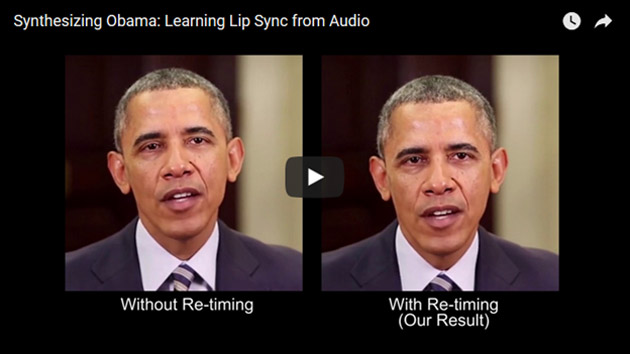| -- | March 27, 2018 Twisted Reality and Fake CEOs By Patrick Watson “Fake news” has become a buzzword, especially connected to social media. Which becomes even more worrisome in light of the recent scandal about Facebook’s shady data-sharing and advertising practices. But we haven’t seen anything yet. Because thanks to the latest technological breakthroughs, reality itself—or at least our understanding of it—could be at stake. But let me tell you about coal mining first. 
Photo: Getty Images The Canary in the Virtual Coal Mine Last year, I wrote about my (ahem) unusual experience trying a virtual reality chat service at the South by Southwest conference. You can read it here: Reality Gets Too Virtual at SXSW. Back then I wrote, “VR technology appears to have outpaced the ability to produce good VR content.” That gap is closing. This month I saw dozens, maybe hundreds of filmmakers showing off their VR productions at SXSW 2018. And when you equip artists like film directors with a new tool, they take it in unpredictable directions, combining low-tech and high-tech to create entirely new capabilities. For instance, I tried a coal mining VR simulation developed by WDR, a German broadcaster. It portrayed the experience of entering a coal mine from 100 years ago. To do this, you wear a VR visor and headphones… but that’s not all. - You stand on a vibrating platform that adds sensations, like doors slamming or riding an elevator.
- They wrap weights around your wrists, so you “feel” the virtual mining tools in your hands.
- Fans and space heaters blow air on you at certain points in the story.
Those simple little tricks aren’t virtual. You feel actual vibration, weight, and heat that enhance the VR sights and sounds, creating a kind of “mixed reality.” Here I am all geared up for the mines. 
Photo: Grace Watson I also tried a new kind of VR from Sony (SNE). Instead of a visor, you wear a helmet with a high-definition video projector on top. They put you in a white room, and the helmet projects a new reality wherever you look. Not having your face covered makes it a different experience. I thought it seemed more realistic – sort of like the Star Trek holodeck. All this is still experimental. People are trying different ideas, and some of them won’t work. But I saw a huge leap just in the last year. In the article I mentioned above, I also wrote: If you think we’re in a “post-truth” world now, just wait. The difference between truth and fiction is already blurry on Facebook. Imagine when we can immerse ourselves in entire new worlds that may or may not be real. Now combine social media with reality-twisting technology, and the problem increases exponentially. For example, in this fake new world, when you see a familiar face say something surprising, you can no longer assume it’s real. | If you're fed up with ads, you should click this one. Jared Dillian has an important message for you. READ IT HERE |
The “Deepfakes” Are Coming Unlike virtual reality, AI-driven “fake” video is ready for primetime. With tools that are available right now, computers can study a person’s voice and facial expressions, then produce a convincing video of that person saying… anything. I know that’s hard to believe. You can see a demonstration video here, produced by University of Washington researchers. They use clips of former President Barack Obama, but it could be anyone. 
Source: washington.edu Well, not quite anyone. The neural networks need lots of video sample data to produce these so-called “deepfakes,” so they work best on public figures, like politicians or actors. Adventurous FakeApp users have used it to create realistic-looking celebrity porn, replacing the original heads of the actors with those of movie stars and singers. And that’s not even the worst you can do with this new technology. Take politicians or top business leaders, for example. Stock prices often move when a CEO or a Federal Reserve official says something important. But did they really say it? With this technology out there, you can’t be 100% sure unless you were in the room. The potential for mischief is obvious. Worse, the mischief-makers can make a bundle by generating price movements, so you can bet it will happen. We just don’t know where or when. Find Reliable Sources The quandary is that these technologies have valuable, legitimate applications, but they’re also highly vulnerable to abuse. VR producers tinkering with new ideas may discover methods that are dangerous in the wrong hands. We should probably expect “fake news” to reach a new level—and we’ll need new ways to find accurate, useful economic analysis. I suggest you identify a few reliable sources whom you know to be real. Don’t expect them to be infallible; as we saw last week, even knowledgeable, well-meaning people are subject to “expert blindness.” What you want are informed yet skeptical curators who can recognize what’s real and valuable. I’m lucky in that regard, since I talk to John Mauldin almost every day. In addition to my own sources, I get the benefit of his network to follow the economy and financial markets. We know they’re real people, not simulations. You may not have direct access to John (though reading his Thoughts from the Frontline is the next-best thing), but you can build your own circle of trust. When you can’t be sure what’s real, quality is more important than quantity. See you at the top,  Patrick Watson P.S. If you’re reading this because someone shared it with you, click here to get your own free Connecting the Dots subscription. You can also follow me on Twitter: @PatrickW.  | Subscribe to Connecting the Dots—and Get a Glimpse of the Future
We live in an era of rapid change… and only those who see and understand the shifting market, economic, and political trends can make wise investment decisions. Macroeconomic forecaster Patrick Watson spots the trends and spells what they mean every week in the free e-letter, Connecting the Dots. Subscribe now for his seasoned insight into the surprising forces driving global markets. |
 Senior Economic Analyst Patrick Watson is a master in connecting the dots and finding out where budding trends are leading. Patrick is the editor of Mauldin Economics’ high-yield income letter, Yield Shark, and co-editor of the premium alert service, Macro Growth & Income Alert. You can also follow him on Twitter (@PatrickW) to see his commentary on current events. Senior Economic Analyst Patrick Watson is a master in connecting the dots and finding out where budding trends are leading. Patrick is the editor of Mauldin Economics’ high-yield income letter, Yield Shark, and co-editor of the premium alert service, Macro Growth & Income Alert. You can also follow him on Twitter (@PatrickW) to see his commentary on current events.
Share Your Thoughts on This Article

Use of this content, the Mauldin Economics website, and related sites and applications is provided under the Mauldin Economics Terms & Conditions of Use. Unauthorized Disclosure Prohibited The information provided in this publication is private, privileged, and confidential information, licensed for your sole individual use as a subscriber. Mauldin Economics reserves all rights to the content of this publication and related materials. Forwarding, copying, disseminating, or distributing this report in whole or in part, including substantial quotation of any portion the publication or any release of specific investment recommendations, is strictly prohibited.
Participation in such activity is grounds for immediate termination of all subscriptions of registered subscribers deemed to be involved at Mauldin Economics’ sole discretion, may violate the copyright laws of the United States, and may subject the violator to legal prosecution. Mauldin Economics reserves the right to monitor the use of this publication without disclosure by any electronic means it deems necessary and may change those means without notice at any time. If you have received this publication and are not the intended subscriber, please contact service@mauldineconomics.com. Disclaimers The Mauldin Economics website, Yield Shark, Thoughts from the Frontline, Patrick Cox’s Tech Digest, Outside the Box, Over My Shoulder, World Money Analyst, Street Freak, ETF 20/20, Just One Trade, Transformational Technology Alert, Rational Bear, The 10th Man, Connecting the Dots, This Week in Geopolitics, Stray Reflections, and Conversations are published by Mauldin Economics, LLC. Information contained in such publications is obtained from sources believed to be reliable, but its accuracy cannot be guaranteed. The information contained in such publications is not intended to constitute individual investment advice and is not designed to meet your personal financial situation. The opinions expressed in such publications are those of the publisher and are subject to change without notice. The information in such publications may become outdated and there is no obligation to update any such information. You are advised to discuss with your financial advisers your investment options and whether any investment is suitable for your specific needs prior to making any investments.
John Mauldin, Mauldin Economics, LLC and other entities in which he has an interest, employees, officers, family, and associates may from time to time have positions in the securities or commodities covered in these publications or web site. Corporate policies are in effect that attempt to avoid potential conflicts of interest and resolve conflicts of interest that do arise in a timely fashion.
Mauldin Economics, LLC reserves the right to cancel any subscription at any time, and if it does so it will promptly refund to the subscriber the amount of the subscription payment previously received relating to the remaining subscription period. Cancellation of a subscription may result from any unauthorized use or reproduction or rebroadcast of any Mauldin Economics publication or website, any infringement or misappropriation of Mauldin Economics, LLC’s proprietary rights, or any other reason determined in the sole discretion of Mauldin Economics, LLC. Affiliate Notice Mauldin Economics has affiliate agreements in place that may include fee sharing. If you have a website or newsletter and would like to be considered for inclusion in the Mauldin Economics affiliate program, please go to http://affiliates.ggcpublishing.com/. Likewise, from time to time Mauldin Economics may engage in affiliate programs offered by other companies, though corporate policy firmly dictates that such agreements will have no influence on any product or service recommendations, nor alter the pricing that would otherwise be available in absence of such an agreement. As always, it is important that you do your own due diligence before transacting any business with any firm, for any product or service. © Copyright 2018 Mauldin Economics | -- |
